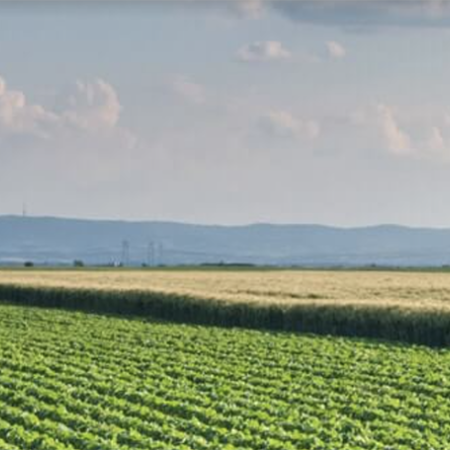September 22, 2021


The landscape is changing for US dry beans. From the Covid-19 "bean boom" to an increased global focus on plant-based living and sustainability, several trends have really boosted business. This week, the GPC chatted to Rebecca Bratter, Executive Director at the US Dry Bean Council (USDBC), to get the inside scoop on what's happening in the industry, how the pandemic has impacted dry beans, and what the future holds for the USDBC.
Rebecca Bratter has been in the business of agricultural trade promotion for 25 years. In her time, she has run global export development and agricultural trade policy programs for all sorts of different commodity groups, including the US Wheat Associates, the US Grain Council, and American Forest and Paper. She also had a two-year stint working with South African humanitarian group Joint Aid Management on global feeding programs. With an impressive background in international affairs and a passion for agricultural and trade promotion, it made sense for her to join the USDBC in 2016.
The USDBC represents farmers, dealers and companies who grow, handle, export and process dry beans grown in the US and is on a mission to get the word out about how healthy, nutritious, and climate-friendly dry beans are.
Rebecca Bratter is a featured speaker at the GPC’s Ask The Experts North America Webinar on September 29.
To start, could you tell us a little bit about the USDBC and its mission?
The USDBC represents a product that is not only healthy and nutritious but also climate-smart. It has a much smaller water use footprint and replenishes the soil rather than depleting it. With what's going on with the climate right now, dry beans fit in very well with our need to be more sensitive to the planet.
I feel like, in general, agriculture tends to be a segment of the economy that, especially in the US, gets overlooked. Often people don't realise what a major pillar of the economy it is. The role of farmers and growers, ranchers and producers is so critical to our everyday existence. The US has such a bounty of agricultural production; we feed so many people. US dry beans, specifically, don't always get their due, and they need a good spokesperson to bring that message to the forefront.
It's also an exciting time for beans and seeing where they can go; and where we can take innovation.
The International Year of Pulses 2016 was a huge turning point for the industry as a whole - how did it impact the US dry bean industry specifically?
It was a really important moment for our industry to get global recognition, especially from an entity that's involved in so many other global issues. To have that UN stamp on our products certainly felt good. It felt like, on a global scale, here's a multilateral organisation recognising the very important role pulses play, for nutrition, feeding and sustainability. It was a great moment that helped us jump to the next level.
For US dry beans specifically, it was a very important moment to make people understand that our product is the perfect little package of nutrition. It does so much: it makes sense economically, it's an affordable source of protein, and it's plant-based. Ultimately, it started the ramp-up into this real current interest and respect for plant-based proteins.
From one spotlight to another, US pulses made it into the New York Times during the pandemic. In its article, it said it was "boom-time" for the bean industry. How did the pandemic affect bean sales, and what's it looking like now?
Well, we talk a lot about the "Covid-bump." I don't know if we could have anticipated or expected it, but it was like a turbo-charge for dry bean consumption and really cranked it up.
The desire for a shelf-stable, healthy, and affordable source of protein translated into unbelievable demand. During the pandemic in the US, you'd go into a grocery store, and you'd see empty shelves. From what I've heard from my colleagues around the world, it was the same in Europe, too.
We were also coming off of a bit of a tight harvest during that time due to weather issues in the US in 2019, and then there was a huge wave of demand from the pandemic. Our industry and our members were so busy and constantly working, waiting for that next harvest. Then, when it came in, from 2020, people were saying as soon as the product hit the bins, it was out the door.
Ultimately, it's been another step in this continuum of bringing us into the spotlight. It was an incredible boost to our business.
In terms of consumption trends, have you seen any noticeable shifting patterns following the pandemic?
People are starting to show a renewed interest in beans. We've spent some time trying to tell people that there's so much you can do with them; they're so versatile. There are so many different kinds, so many different flavours and functionalities. I think the pandemic opened the door to that, and I think that door is going to stay open, hopefully forever. People didn't stop eating beans once the pandemic eased up. This has given us the momentum to move more into the area of innovation.
It has let the industry know there's an appetite out there for bean ingredients, and people are very interested to learn more. For example, people are looking into bean flour to make bread. It's gluten-free, no GMOs, it's sustainable, it's healthy. People are also looking into making desserts from beans, using black beans, red beans, and pinto beans to make brownies.
It's given a boost and momentum to the idea of innovating with beans and exploring what we can do with them. There's so much, and we're right at the beginning of that continuum, so I'm excited to see where it goes.
Regarding US bean exports, have you seen any spike in demand?
Exports have been pretty booming! Traditionally, we have three very large bean export markets, which might become four now that the UK is separating from the EU. So, that includes the UK, the EU, Mexico and the Dominican Republic.
Demand has been high, but at the same time, exports to the EU and the UK could be higher. Unfortunately, as a result of getting caught up in the trade disputes over the last three years, we've been facing punitive tariffs there. We've been working really hard to get those tariffs down and have heard that by the end of 2021, they will disappear for dry beans in the UK and the rest of Europe. We're certainly looking forward to that.
That, plus the huge demand for dry beans in that part of the world, is going to be a very good thing for us. Of course, we have competitors and we're not the only source but, if you ask me, we're the best source.
Partners like Mexico are always going to be incredibly important to us. Besides Canada, it's the one place we don't have to ship to; we can rail products in. We also have shared cultural ties as well as a border.
Mexico relies heavily on rain to feed a good portion of their dry bean crop, and with climate change, there have been such weather extremes. So when Mexico's own domestic crop is off, we export more there. Ultimately, the interest in beans there, plus the impact of climate change, has translated into very healthy exports to Mexico.
Exports to the Dominican Republic have remained strong. We have a trade agreement there, which sometimes works, and sometimes doesn't. So, we're working through some of that.
We've also been investing a lot into Central and South America, and we're interested to see what happens with the UK, now that it has its own market with its own trade regime.
You mentioned trade disputes; how is that situation evolving under the new administration?
There's been positive movement, and it's moving towards re-establishing the US-Europe link, which was re-examined under the previous administration. Now it appears that the pieces are being put back together, re-solidified. Hopefully, that will eventually translate into positive deals with trade. It's been slower than we'd like, but it looks like it's going the right way.
For me, globalization, multilateralism and trade agreements are my lifeblood; that's what I've trained for; I come from a world where they're good things. I feel very much that that's been re-examined. Globalization and self-sufficiency are being looked at in a way I didn't quite expect. Re-examination is a good thing, and things always need to be updated and refreshed: after all, the world is changing. Still, I hope we see the World Trade Organization become an important arbiter of world trade again.
I also hope we see a global regime where we are all working together and going in the same direction, organisations like mine depend on that. We need a world where we can export and trade globally without facing incredible barriers such as those with shipping, containers, and port delays. The world is in disarray, and it will take all of us to work out how to get through it.
You are one of the featured speakers in the upcoming Ask the Experts North America webinar. What can you anticipate about the topics you will be addressing there?
I'll be speaking about the importance of global trade and open markets, as well as how US dry beans are experiencing a wave of popularity and moving into the spotlight. I'll talk about the reasons why there's an increasing desire to eat a more plant-based diet and an awareness of the health benefits. I'll also discuss how the younger generations (Millennials and Gen Z) are looking to eat more consciously, in a way that leaves a good imprint on the earth and how beans are a solution to that.
I'll speak about the USDBC's events and global programs and how this year of change has informed them. We've polished things up with our social media presence. We're working with high profile chefs doing incredible things with beans; it's gratifying to see how our humble beans are helping businesses and chefs improve their own bottom line. It's been wonderful. We also had our first-ever global buyers event in 2021, BeanCon. We'll be doing it again in 2022, which will have an innovative and interesting agenda, combining the latest and greatest trends in beans, along with crop harvest and quality information. Our Harvest webinar is in November, too.
It sounds like you'll be exploring some interesting topics and that the USDBC has a really exciting future going forward.
Yes, I really believe that pulses and beans have so much to offer for the future. I think beans offer some incredibly unique properties that other products don't. Whatever it is, you can make it plant-based. I think that's catching on, and I hope our popularity is here to stay.
Disclaimer: The opinions or views expressed in this publication are those of the authors or quoted persons. They do not purport to reflect the opinions or views of the Global Pulse Confederation or its members.